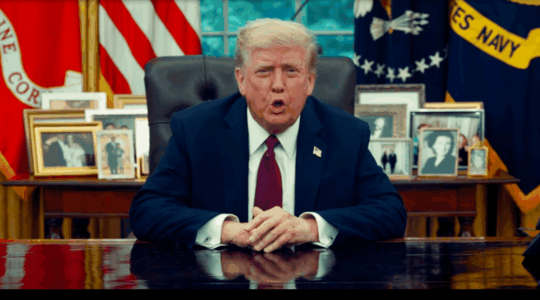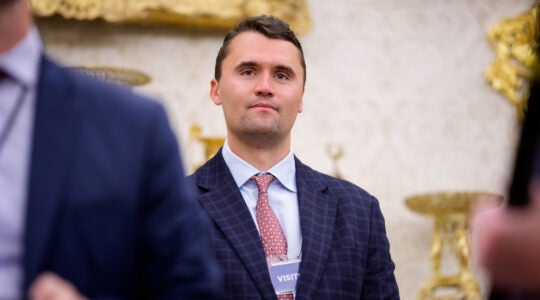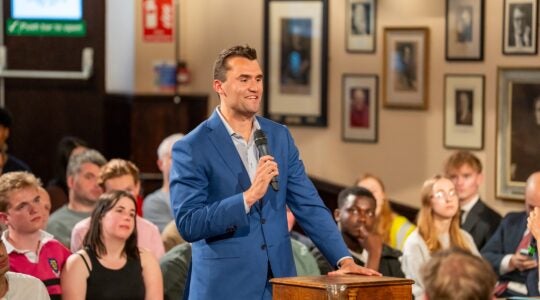WASHINGTON (JTA) — In the wake of last week’s arrests of several prominent rabbis, some Orthodox leaders are working to ensure that their institutions are following the letter of the law.
At a Chabad-Lubavitch regional conference over the weekend in northern Virginia, several of the Chasidic movement’s senior rabbis stressed the importance of obeying the law, according to Rabbi Levi Shemtov, director of the Washington office of American Friends of Lubavitch.
The movement’s late spiritual leader, Rabbi Menachem Mendel Schneerson, "clearly instructed all emissaries of Lubavitch that all activities, particularly those undertaken in the name of the movement, must be lawful,” Shemtov said. “The Talmud clearly rules that the law of the land, especially in the case of a government which allows Jews to live freely, takes on the force of Jewish law.”
In New York, a leader of Agudath Israel of America, an umbrella group bringing together several Chasidic and non-Chasidic communities, helped organize a meeting to stress the same theme. The meeting was to feature two prominent rabbis and two well-known New York lawyers, Benjamin Brafman and Jacob Laufer.
The meeting was announced in an e-mail sent out by Agudah’s executive vice president, Rabbi David Zweibel, to the organization’s supporters. Titled “An Urgent Gathering,” the e-mail said the meeting would be “focusing on the timeless (but also all too timely) theme of ‘Vi’asisa hayashar vi’hatov,’ or making sure one is doing ‘the good and honest thing.’ "
“In the wake of recent headlines and front-page photographs that made every feeling Jewish heart ache, it is even more timely for us to take a good, hard look at our obligations to our fellows, to our society, to our government,” Zweibel said in the e-mail, adding that “I am confident that you realize how vital it is that we hear words of mussar [taking stock] and chizuk [reinforcement], and that we learn to distinguish between conduct that conforms with dina d’malchusa [the law of the land] and conduct that does not.”
The meeting comes less than a week after five New York and New Jersey rabbis were arrested July 23 on charges of money laundering. Authorities say the rabbis accepted large checks made out to tax-exempt charitable organizations associated with their synagogues, usually keeping 10 percent of the money and returning the rest to the donor in cash.
The charges somewhat echo a case involving the spiritual leader of the Spinka Chasidic sect in December 2007, in which religious leaders in New York and Jewish businessmen in Los Angeles were charged with soliciting “tens of millions of dollars” in contributions to their charities while secretly refunding as much as 95 percent of the donors’ money, allowing the contributors to claim improper tax deductions.
The head of the Spinka group, Rabbi Naftali Tzvi Weisz, agreed to plead guilty to the charges earlier this month.
A criminal defense lawyer familiar with the Jewish community said he doubted that the New Jersey and Spinka cases signaled any kind of targeting or trend among federal prosecutors of Orthodox Jewish groups.
“I think it’s a coincidence,” said the lawyer, who did not want to be identified. The cases are “instances of somebody trying to reduce their own sentence” by telling the government what he knew about other possible criminality, he said.
In both scandals, a defendant charged with serious financial crimes unrelated to the Jewish community became a confidential informant for the government, wearing a wire to implicate rabbis.
A U.S. Justice Department spokesman declined comment on both affairs and referred a reporter to the individual U.S. attorneys offices that brought the charges.
The Orthodox Union declined comment on the New Jersey scandal.
One expert said the best ways for charities to avoid getting caught up in any trouble with the law are pretty basic.
First, “stick to what the mission really is” of the charity and don’t start freelancing, said Kenneth Ryesky, an attorney who teaches tax and business law at Queens College in New York.
One rabbi who did not wish to be identified said he periodically gets a request from a potential donor similar to what the Spinka rabbis were allegedly doing — accepting a large check and returning most of the money in cash to the donor — and always rejects the offer immediately.
That’s the best reaction, Ryesky said.
“If it doesn’t pass the smell test," he said, "don’t have anything to do with it.”
JTA has documented Jewish history in real-time for over a century. Keep our journalism strong by joining us in supporting independent, award-winning reporting.





